Breaking: Autopsy reveals how Cyrus Jirongo died
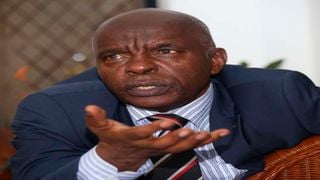
Makueni Governor Kivutha Kibwana during a past interview in Nairobi.
| File | Nation Media GroupEducation
Premium
Top politicians who still go to the classroom to teach
What you need to know:
- Prof Kibwana says that it is passion for academia that motivates people like him to remain active in academia.
- Prof Nyong’o says he used to teach political theory and economy of development at the University of Nairobi when he was a senator.
Teaching is affectionately referred to as a noble profession, although many who are not convinced of its nobility end up finding greener pastures elsewhere.
Many academicians leave the profession upon joining politics, landing plum state jobs, joining public service ranks or even the corporate world, however, a few of them stand out for their love for academia and juggle teaching or supervision of post-graduate students with their full in-trays of public service.
They cannot just stay away from the lecture rooms.
Bitange Ndemo
For Professor Bitange Ndemo, once an academic, an individual will always be in academia since it gets to a point where one gets “addicted”.
The University of Sheffield alumnus says that when he retired from active full-time teaching as a senior lecturer and joined the public service as a permanent secretary in the Ministry of Information and Communication between 2005 and 2013, he was still supervising PhD students.
“It is an addiction and love for academia, not the money. As a full professor, my salary is not even Sh400,000, it is lower than what some of my students earn,” he says.
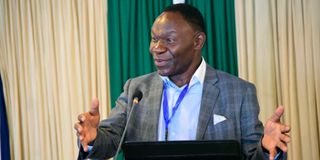
Professor Bitange Ndemo during a past function in Nairobi.
He currently serves as a professor of entrepreneurship at the UoN’s Business School, teaching and researching on entrepreneurship and research methods, with focus on ICT within small and medium enterprises, and their influence on economic development in Kenya.
Prof Ndemo considers his period as PS an academic sabbatical in the industry to enhance his role as a lecturer.
“It helps to go to industry briefly and come back to marry theory with the practical bit.”
Kivutha Kibwana
Makueni County governor, Prof Kivutha Kibwana, says that it is passion for academia, which he considers a life-long pursuit, that motivates people like him to remain active in academia even after crossing over to politics or public service. He recalls that when he was working as former President Mwai Kibaki’s adviser, he enrolled for a master’s degree in Theology to ‘exercise his mind’. He was already professor of law by then and had served as MP for Makueni Constituency as well as a cabinet minister.
The two-term Makueni County governor considers academics his primary job, having taught at UoN for 25 years between 1977 and 2002 when he vied for and won the parliamentary seat.
“I came from an entirely academic and civil society background where we used to do a lot of reading and research. People put a boundary, but I still spend a lot of my money on books to keep abreast of new ideas because if you don’t exercise your brain in an intellectual way, it begins to atrophy,” he explains.
Currently, the Havard-educated lawyer is involved in informally supervising post-graduate students from his county, helping them in their research work.
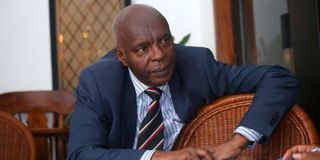
Makueni Governor Kivutha Kibwana during a past interview in Nairobi.
He is also invited to give commencement speeches and to co-lecture in various universities in the country including, UoN, Kenyatta University, Tangaza University and Strathmore University.
Prof Kibwana has also published a book, Walk With Me God, and is in the process of launching a collection of poetry titled, “These Words”.
“When I retire from politics, there are things that I will want to write about, like the history of the constitution, devolution, all these constitutional law issues so I have to try to follow those areas in the academic world.”
Prof Kibwana has announced his intention to run for the presidency next year.
Irungu Kang’ata
Murang’a senator Irungu Kang’ata began lecturing in 2016 at the Catholic University of Eastern Africa (CUEA) upon graduating with a master’s degree in Social Foundations of Law and Criminology from the University of Nairobi.
At that time, he had been in politics for nine years having risen from a councillor in 2002 to a member of parliament for Kiharu Constituency in 2013. He was admitted to the bar in 2007.
Even after being elected Murang’a Senator in 2017, Dr Kang’ata continued to teach, his hectic political life notwhithstanding. From May 2020 up to February this year, he served as the Senate Majority Whip but still made time to attend to his students.
He is required to teach four hours a week, teaching classes of about 200 students. The hours sometimes increase to eight a week when teaching two classes.
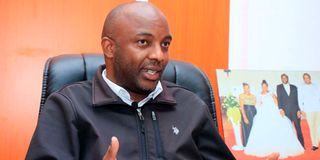
Murang'a Senator Irungu Kang'ata during an interview at his office in Upper Hill on April 10, 2020.
“It is more of a passion and love for academics, even when I was busy in the Senate as a chief whip, I still set aside some hours to teach. We often would agree with the students over make-up classes if I missed a class,” he adds.
Dr Kang’ata completed his PhD last year and is currently teaching Constitutional Theory at the University of Nairobi. He explains that a doctorate degree is about research, which is sharpened by exchange of ideas, and that there is no better place for that than in a university.
“You can easily forget your skills if you don’t teach. I don’t see the reason why a person would strive to be a PhD holder yet is not teaching,” says the legislator.
To strike a delicate balance between teaching, politics and his family, he spends time with his family in the evening, visits his constituents on weekends and dedicates weekdays to lecturing and legislative matters.
“It can, however, get hectic when you have to read and teach eight hours a week as well as mark examinations for about 400 students.”
Anyang’ Nyong’o
Kisumu governor Prof Anyang’ Nyong’o says that when he was a senator, he was still teaching political theory and economy of development at UoN.
When he served as Kisumu Rural MP between 2007 and 2013, he was publishing, consulting for foundations, served as secretary general of the African Association for Political Science, and a member of various boards of journals.
Todate, he still reviews manuscripts before they are published, writes critiques, and gives speeches at local and global conferences.
“It is hectic, but the interest and commitment matter more than anything else. You choose to go into academics because it is a calling, just like being a priest,” avers the governor.
“It is like people who are lawyers and are in Parliament but still continue to run their law firms. The equivalent of a law firm for us is the university or any other academic institution.”
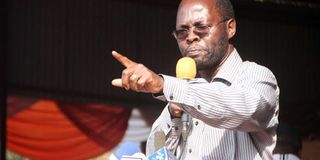
Prof Nyong’o holds a master’s degree and PhD in political science from the University of Chicago. He also served as the Minister for Medical Services as well as for Planning and National Development.
“You must keep up with the advancement of knowledge. What African politics was 20 years ago is not the same now and so you must keep up with these dynamics. If you stop reading and writing, then you lose the tools of the trade,” he says.
The former minister disagreed that shortage of professionals is what makes the available few remain in the classroom, rather, it has to do with one’s marketability and relevance, based on their contribution to their disciplines.
“There are so many people who call themselves professors, but apart from the name, they are not known by their peers in their discipline,” adds Prof Nyong’o.
Others in public service but who remain active in lecture halls include Education cabinet secretary Prof George Magoha, Siaya senator James Orengo and his Tharaka Nithi counterpart Prof Kithure Kindiki.
Ayiecho Olweny
For former Muhoroni MP and assistant minister for Education, Prof Ayiecho Olweny, politics never stopped his scholarly life even in the years he was an MP between 2002 and 2013.
“It took me 25 years in school, a quarter of a century, and it is something I can’t drop because of politics. I am not trained as a politician, but as a scholar. Politics come and go.”
He says he will remain an academician till his death. He told Higher Education that even when he was still active in politics, he was still publishing and supervising master’s and doctorate students.
“I have been in academia all my life. Although I will still remain a politician, that does not remove books from me. I still read, write and teach. I love teaching,” he points out.
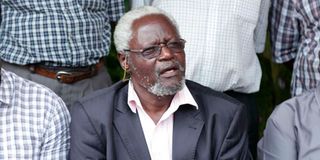
Former Muhoroni MP and Assistant Minister for Education, Prof Ayiecho Olweny.
Prof Olweny attained a PhD in Genetics from the University of California in 1985 having earlier graduated with a Master of Plant Science in plant breeding from the University of Nairobi in 1980.
He would join the academic world as a tutorial fellow in 1981 at UoN, rising through the ranks to become an associate professor in 2000. He then joined Maseno University upon becoming a full professor before plunging into politics in 2002 when he won the Muhoroni parliamentary seat.
After he lost his seat in parliament, he went back to lecture at the UoN for a year and two months before moving to Maseno University in July 2014, where he still teaches.





